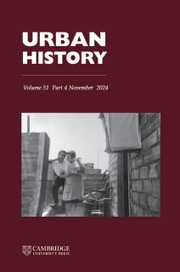Article contents
‘A tale of two cities’: the memory of Ferrol, between the Navy and the working class
Published online by Cambridge University Press: 10 June 2005
Abstract
The city of Ferrol was designed ‘ex-novo’ by military engineers to serve the Spanish monarchy and to house its naval base and dockyards. The principles of stratification on which society was based, and the need to defend the city from enemy attacks and to discipline workers led to a spatial plan that segregated the Navy officers and the working classes. In the nineteenth century, the naval base and the enclave economy of Ferrol became obsolete. Furthermore, the new political culture of the nation state and liberal democracy complicated further the task of controlling the working class. The Spanish Civil War allowed for the updating of Ferrol's spatial plan thanks to the identification of a single enemy both inside and outside: the political repression of the working-class became a major issue in the victory against the II República. The Franco regime meant the return of a segregated and militarized Ferrol, whereas in the 1980s, European integration and the transition to democracy made this model obsolete.
It was clearer than crystal to the lords of the State preserves of loaves and fishes, that things in general were settled for ever. Charles Dickens, A Tale of Two Cities
Because I do it with a little ship only, I am called a thief; you, doing it with a great navy, are called an emperor. Augustinus, De Civitate Dei
- Type
- Research Article
- Information
- Copyright
- © 2004 Cambridge University Press
Multimedia Article
This package contains the source files for one of the Urban History multimedia companions created to accompany the Urban History article entitled ‘A tale of Two Cities’. The Memory of Ferrol, between the Navy and the Working Class, by José María Cardesín and originally hosted as an online resource by Cambridge University Press. These files contain multimedia content in a now deprecated format, Adobe Flash. Please note that links to third party resources will be retained here in the original form provided by the compilers of the multimedia companions. The Press does not warrant that links from archival entries will continue to function correctly and does not undertake to redirect or suppress links when third party sites cease to be available
- 3
- Cited by


